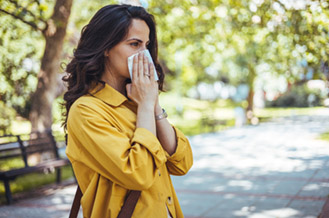
Eye allergies (called allergic conjunctivitis) occur when the eyes react to matter that irritates them, called an allergen, and produce a substance called histamine to fight off the allergen. In New England this time of year, pollen is the most common type of allergen causing eye irritation. But you could also suffer from chronic perennial allergies from indoor allergens such as dust or pet dander. Here is what OCB eye doctors want you to know about allergies:
Symptoms
Your eyes become red, swollen and itchy. You may experience sneezing and a stuffy, itchy nose, a headache and itching or sore throat.
What You Can Do
Avoid rubbing your eyes. Eye rubbing can bring allergens to your fingertips and therefore in direct contact with your eyes.
Wash allergens away. When environmental allergens are active, be sure to shower before you go to bed, washing your hair and face, or run a wet brush through your hair. Most people do not realize that they may be sleeping on a pillow swarming with allergens.
Start with eye drops. If you experience mostly eye symptoms and not systemic allergy symptoms, you could take over-the-counter antihistamine drops. You could also apply saline eye drops after being outdoors to wash away allergens.
Cool your eyes. Cool compresses and refrigerated artificial tears help to relieve itchiness.
Avoid “redness relief” drops. It is best to avoid drops that advertise getting the redness out of your eyes. Long term use of these can have detrimental effects on your eyes.
Dry eye and allergies. Allergy symptoms can make your dry eye worse. If you are suffering from both, treating your eye allergies will in turn help your dry eye symptoms.
If over the counter measures are not helping your condition, schedule an appointment with your OCB eye doctor.
